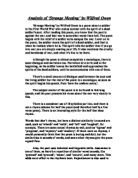“The other relics: the ones that made me weep; the bits of burnt clothing, the stopped watches, the torn shirts, the twisted buttons, the stained and tattered vests and drawers, the ripped kimonos and charred boots, the white blouse polka-dotted with atomic rain, indelible, the cotton summer pants the blasted boys crawled home in, to bleed and slowly die.” (No More Hiroshimas)
This shows the reader the true horror of war, and as a poet this was what Wilfred Owens’ goal as a war poet was. These are the human things; they mean more than the built things and the shallow souvenirs.
The language of the two poems is dissimilar. James Kirkup’s “No More Hiroshimas” uses direct language that is simple for the reader to understand, while Wilfred Owens’ “Strange Meeting” uses ornate language to try and represent the hell he is in, and the true devastation of war.
“It seemed that out of battle I escaped down some profound dull tunnel, long since scooped through granites which titanic wars had groined” (Strange Meeting)
“Strange Meeting” is an early 20th century poem and therefore he uses more complex language, but James Kirkup wrote his poem later in the 20th century and his language is straightforward and shows the reader a more personal touch to the suffering of war, rather than talking about the general hopelessness of war.
James Kirkup blames the superficiality of the people for making the war a cheap way of making money. Money is a constant theme throughout Kirkup’s poem unlike Wilfred Owen, who is more worried about the lives of soldiers instead of the respect of the victims.
“Here atomic peace is geared towards the tourist trade” (No More Hiroshimas)
He is saying here that stopping wars is second to the financial gain of the residents. Both James Kirkup and Wilfred Owen want was to be a thing of the past, but they think this cannot happen if the people are more interested in the heroism and bravery of war compared to the rehabilitation and reality of war.
Both poets believe war to be unacceptable. War has left them without hope because of the memories that they have. After wars, the feeling of the town is cold and dead. A distressing scene is left to rot, but for what reason?
“A hideous pile, the Atomic Bomb Explosion Centre, freezing cold.”
Neither of the poets believes that war is the answer, and after the bomb on Hiroshima, the reader gets a view of the waste of life and the mindless destruction of earth that war creates. There are many references to ‘cold’ throughout “No More Hiroshimas” and this gives the reader a view of the silence and abandonment of not only the town, but also the victims.
These two poets love their fellow man, and want their poems to help stop war altogether. Wilfred Owen, in his poem “Strange Meeting” meets someone (who might be himself) in a dream or nightmare, and even though they are at war, he loves him as he loves himself.
“I am the enemy you killed, my friend” (Strange Meeting)
The situations of the two poets in each of their poems are different. Wilfred Owen is in the war, in his own vision of hell, but in contrast, James Kirkup is seeing the war from a distance and is considering his viewpoint a while after the actual war. Wilfred Owen sees the war first hand, and sees the suffering that his colleagues are dishing-out. James Kirkup sees that shallowness of the people who are scavenging off the memorials of the deceased, and are using the war as a source for their own gain.
Both of these poets want the real truth to be known to everyone, so that they can realise the pity of war. The real truth is not being told, and because of this, wars keep occurring, and the true facts are never known.
“I mean the truth untold, the pity of war, he pity of war distilled” (Strange Meeting)
The genuine truth of war is being watered down so that it can be made easier to understand; yet due to this lack of knowledge, the souvenir shops and tourist trade is increasing and depicting war like it is in a Hollywood film, and they forget the true distress and agony of war.
“Let it remain like this, for all the world to see, without nobility or loveliness, and dogged with shame that is beyond all hope of indignation.” (No More Hiroshimas)
There is no respect in the “souvenir-shops piled with junk” and the pity of war is that people are so shallow that they try to cover over all that has happened with the “shallow permanence” of souvenirs and tourism
In conclusion, I believe James Kirkup’s poem, “No More Hiroshimas” to be the poem that speaks most clearly to me because it is a more direct and graphic portrayal of the suffering of war. He explains in more detail the superficiality of the residents, and the touching memorials of the victims give the reader a more vivid depiction of how people endured the war. Wilfred Owen has a more indirect approach and shows the reader the hell of war, but James Kirkup gives the reader real life examples and his simple language makes it much clear for the reader to truly understand the pity of war.








